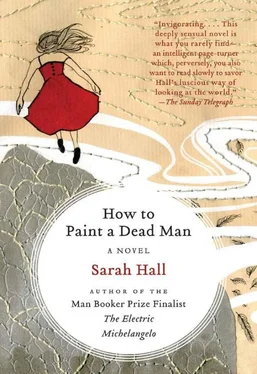Sarah Hall - How to Paint a Dead Man
Здесь есть возможность читать онлайн «Sarah Hall - How to Paint a Dead Man» весь текст электронной книги совершенно бесплатно (целиком полную версию без сокращений). В некоторых случаях можно слушать аудио, скачать через торрент в формате fb2 и присутствует краткое содержание. Год выпуска: 2009, Издательство: Harper Perennial, Жанр: Современная проза, на английском языке. Описание произведения, (предисловие) а так же отзывы посетителей доступны на портале библиотеки ЛибКат.
- Название:How to Paint a Dead Man
- Автор:
- Издательство:Harper Perennial
- Жанр:
- Год:2009
- ISBN:нет данных
- Рейтинг книги:4 / 5. Голосов: 1
-
Избранное:Добавить в избранное
- Отзывы:
-
Ваша оценка:
- 80
- 1
- 2
- 3
- 4
- 5
How to Paint a Dead Man: краткое содержание, описание и аннотация
Предлагаем к чтению аннотацию, описание, краткое содержание или предисловие (зависит от того, что написал сам автор книги «How to Paint a Dead Man»). Если вы не нашли необходимую информацию о книге — напишите в комментариях, мы постараемся отыскать её.
, Sarah Hall, "one of the most significant and exciting of Britain's young novelists" (
), delivers "a maddeningly enticing read... an amazing feat of literary engineering" (
).
How to Paint a Dead Man — читать онлайн бесплатно полную книгу (весь текст) целиком
Ниже представлен текст книги, разбитый по страницам. Система сохранения места последней прочитанной страницы, позволяет с удобством читать онлайн бесплатно книгу «How to Paint a Dead Man», без необходимости каждый раз заново искать на чём Вы остановились. Поставьте закладку, и сможете в любой момент перейти на страницу, на которой закончили чтение.
Интервал:
Закладка:
There is a world. Who wrote that-was it Sartre?
Almost thirty years ago! The kids were enthralled as youngsters when he talked about San Francisco and Alphabet City. North Beach. Vesuvio. The Village. It was as if he’d been up the beanstalk and back down again, and true, he spun it that dark delighted way for them, exaggerating, ornamenting, giving it some welly. But he loved their wide and wonderful eyes. It was pure magic, the look on their faces-all Christmassy and open. He invented a whole treasury of fables just for them. It was over there he realised exactly why he should wear the artist’s beret, because it was illegal not to if you were an artist, and they could throw you in jail. It was over there that he hung out with Brautigan, and things were pretty crazy, and the hippies came. Over there, he surfed in a tuxedo. Over there, he enjoyed the presentation, from the mayor himself, of a skeleton key to Frisco, which got him into the best joints, temples, and on to the ferries. He still had it in fact, here in his pocket (yes Suzie, coincidentally similar to the key for the cottage mortise). Over there, he drank absinthe, smoked opium, took excellent $5 acid (this one told a little later, after Danny had asked for poppers for his thirteenth birthday—‘I’m interested in getting out of body, Dad’). Over there he ate sea snake, mandrake, barbecued griffin wing, probably actually did without recognising it, those Chinese restaurants, ho-ho. San Francisco was psychedelic, man. New York, well it was just the bees’ knees — literally-all the skyscrapers were built from giant insect parts, what, didn’t they know!? They with their faces like open mouths, drinking his fantasies in. Those were the days!
Now Susan’s been to visit these places with pals she made at college, to jewellery sales, Telegraph Hill and the Nuyorican café. She likes the New York dog-runs, she says, the égalitaire of canines. ‘It’s true democracy, Wilse, big ones taught to play with little ones.’ A perverse dependence on therapists though, she says, scowling. The twang of touched nerves in his daughter. Should he feel guilty about that? Who knows. ‘Hey, kiddo. If you were there in the sixties,’ he tells her, ‘you’d know. We were all into scrambling back then. Baby boomers have omelettes for brains.’ Yeah, yeah, yeah Peter, the sixties, old hat, poor line. But you’ve got to keep justifying things. You’ve got to defend the imagination or the world goes under, of this he is sure. Meanwhile, the kids accept his blag now like they’d put up with a doddery relative’s foibles; vowel glitches developed to cover the geriatric stutter, weepy drunkenness at weddings, the uncontrollable passing of gas.
He twitches the hot tap with a hairy big toe. Warm water streams in around his heels and the bathroom fills with humidity. He balances the bar of soap on his belly.
It’s unravelled in their minds now, his exuberant, figmented past. It’s been investigated, confronted, and vetoed. It’s just shite, fertiliser for their cynicism to grow. ‘You couldn’t have been at The Six Gallery in fifty-five, Dad. You were only fifteen.’ They believe none of it any more, not even the actual actualities. Oh! The pair of them! When did the growing-up happen! He only had his eye off them for a minute. It seems like yesterday they were in nappies, twittering on in that peculiar talk of theirs. They were both so pale as children that he could see through to the red scribble of capillaries in their cheeks and in their ankles. He could see absolutely how they were made, the remarkable pattern of cells. He would hold their bare, doughy feet as they slept in their cots and stare. Or he’d nuzzle up to their faces and examine the threads in their cheeks. ‘Let them sleep,’ Lydia would whisper from the nursery door. ‘They’re tired little things. Come and pour me a damson gin while I’m on boob reprieve.’
He never mentioned this fascination to anyone, not even Lyds, but it did occur to him there must be secret infant fascinations the world over. As they got older and ran about outside in the sun, their skin grew thicker, becoming less transparent. The bright alveoli patches disappeared. It made him sad really. There was something in the private display he had loved. He would peer at Susan’s ankles all through her teenage years, until she got fed up with it and demanded he stop, saying that he was being a weirdo.
And there’s the gist of it. All innocent mechanisms are muddied up with experience. Children become less and less translucent. Layers of guile and suspicion grow. It’s the law of paternal disenchantments.
The fact is he can’t exactly remember his legacy, can’t entirely defend himself, and say, as a matter of fact, O petty disbelievers, O ye of bolshy attitude, I am telling the absolute truth. He has contaminated the water supply with piddle, so to speak. The Big Bumper Book of Peter’s Life and Times is a white-paged, ad-libbed tome. But he does recall, with some clarity, the hot gothic stoops in the Village, the cooking summer steps against which they lolled, and the desperation for an old brass rotary fan found in somebody else’s trash, saved and re-wired. In winter, the obverse, the necessity for several jumpers, apartments too cold even to piss in, and hot dumplings gobbled down at Vaselka to make them thaw. If he concentrates, he can remember the extraordinary districts of San Francisco. The Asian tattoo parlours. The views. Rivera’s frescoes. He remembers the feeling of anti-climax when everything began to fade, when life began to look too real again.
And he can remember her. He can remember her long slim American legs. Her astonishingly clear eyes and her awful bloody temper. Her never going without a high for more than a day. The depressions that tasted nothing like apple pie, that tasted lysergic, like chemicals dripped on to paper. The clever Latin ink on her inner thigh: Believe Not What You See. This is what he’s come away with, what he’s managed to stash in the chaotic archives of the brain. It’s not very pleasant, wouldn’t be fun conveying it to anyone, the way the phantom friendship with Ginsberg is-that myth founded on a collision at a party and a brief exchange through untrimmed beards.
Raymie had legs like the spindles of the water towers, and she also was bursting with moisture; this he elliptically knows. But there are few cherished recollections.
Do his peers have the capacity to recall their former lives better than he can? Do they see fragments in the necklines of actresses in films, or find themselves wafted back by cheese or sandalwood smells? Is everyone in his generation taking gingko biloba, doing brain aerobics and writing pompous memoirs? Or are they all crumbling mentally, having heart attacks while shopping for tweed jackets, or banging their secretaries, or emptying their colostomies? Dear God, are they officially old?
What he needs is a smoke.
Beneath him the bathwater is turning tea-coloured, his balls float white and wrinkled in the stew. The room smells half of soap, half of Danny’s pilfered ganja-he knows the good stuff when he sees it, does Master Caldicutt, wants none of the muck coming in from Spain these days. He’d reach for it himself while the rest of his filth slurries up the tub but the pouch is in his studio upstairs. Forgot to fetch it before getting in. Ho-hum. Pass the bloody gingko.
Yes. He remembers Raymie. Bleeding from her nostrils as if she would never stop. Narcotic pioneer, showing them all how it was done. Holding forth about post-modern art and the inauthentic project of being. Being thinner and more beautiful than all the other girls. Climbing the railing of the Empire State Building, her pale hand fluttering like a bird in the uproar. He remembers that night, before they bailed out of college, before they left merry old England for her home turf. The horrible ménage à trois. Him, their tutor, and her. The cuckold, the muse, and her new lover. Their bizarre agreement to share a human experience of loss and love and urges, to signal an end and a future between them. So he had to watch. He had to uncouple his primitive urge to smash in their skulls as she turned around on to all fours. And the man he had loved and respected like a father whispered to Peter, ‘There, I’ve warmed the pearls for you, you bastard,’ as he slid off the bed and left the room. Free love. More like a fucking disaster. There are some memories that won’t leave, no matter how hard he coaxes them.
Читать дальшеИнтервал:
Закладка:
Похожие книги на «How to Paint a Dead Man»
Представляем Вашему вниманию похожие книги на «How to Paint a Dead Man» списком для выбора. Мы отобрали схожую по названию и смыслу литературу в надежде предоставить читателям больше вариантов отыскать новые, интересные, ещё непрочитанные произведения.
Обсуждение, отзывы о книге «How to Paint a Dead Man» и просто собственные мнения читателей. Оставьте ваши комментарии, напишите, что Вы думаете о произведении, его смысле или главных героях. Укажите что конкретно понравилось, а что нет, и почему Вы так считаете.












